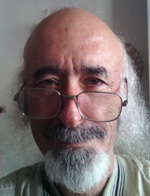By Dan Bloom

CHIAYI CITY, Taiwan — For a group of 17 short story writers in Canada, putting together a collection of stories for a new anthology titled Cli-Fi: Canadian Tales of Climate Change was a labor of love and a commitment to speak up about the risks and fixes for runaway global warming.
Bruce Meyer put out a nationwide call last year for short stories from Canadian authors, and 300 submissions came in, he told San Diego Jewish World. And during a recent television appearance on the The Agenda in Ontario hosted by veteran Jewish journalist Steve Paikin, Meyer said that he chose 17 stories for the final cut. The book was published by Exile Editions with Michael Callaghan serving as editorial director. Stories by Kate Story, Peter Timmerman, Leslie Goodreid and Nina Munteanu, among 13 others, are contemporary examples of cli-fi writing of the short story kind, and they are getting media attention now across Canada and the rest of the English-speaking world, from Australia to Britain.
Paikin introduced his TV program that included Meyer, Story and Timmerman on the studio set, by noting that that the new climate change fiction anthology is charting new literary territory.
“Climate change is no fiction, but a new short story anthology attempts to bring an imaginative response to one of the world’s greatest crises,” he said. “The Agenda welcomes the book’s editor and several of its authors to talk about their fictional tales, and why writers need to respond to the threat of climate change.”
For the next 30 minutes, the three panelists and their host chatted about climate change and literature.
“The Earth’s climate is not infinite,” Meyer, a well-known literary figure in Canada, said in the introduction of the anthology. The air we breathe, the water we need to sustain life, even the temperature of the day, are all necessary ingredients for the survival of human beings. That said, what we remove from beneath the ground – the coal, oil, gas and metals – do not simply disappear because we release them into the air or the water. The more we make, the more we need to unmake, and that creation of new things, that use of non-renewable resources for energy is an enormous expression of our self-deception: we merely rearrange what already exists in the world, and those rearranged things do not simply disappear because we want them to. The world’s capacity to absorb and tolerate misplaced carbon, among other things, has reached the point where the balance of nature has been permanently altered by human activities. What is one day’s resource will become another day’s waste and another day’s waste will become another day’s poison. The result of this process is already evident.”
Imagining the results of climate change is nothing new, though it has not been a topic of necessity for most writers in Canada, Meyer added, noting: “We ?[Canadians] ?learn to ignore those things that do not celebrate our potential for failure. We write about our successes because success reinforces that status quo and comforts us. The uncomfortable topic, the unsettling reality, is a hard sell to readers and an even harder sell to writers as subject matter.”
So his new anthology is an attempt to change all that in literary circles in Canada, he said.
“Canadian literature, by virtue of its thematic matter, should offer some hope,” according to Meyer. “Canada has produced a literature that is conscious of its setting. The ramifications of nature are omnipresent in the works of Canadian writers; yet for all the wilderness musings of snowfalls or even hard-scrabble dustbowl farming, climate change has not been a major concern, until now. This anthology was an answer to a call that was made by Margaret Atwood in April of 2015.”
Meyer explained that Atwood came to Ontario that year to speak at a high-school literary festival with the evening having a theme: our relationship to the world and what we can do to save it. During her address to the audience, Atwood reminded everyone of the warnings Al Gore, had sounded in his 2006 film ”An Inconvenient Truth” The film went into worldwide theatrical release and roused considerable international discussion.
In the middle of Atwood’s discussion of the impact of climate change, Meyer recalled, she paused and put a question to the audience: “Where are all the Canadian writers who should be addressing the greatest crisis of our age?” There was dead silence. No one knew how to respond.
“Atwood had been doing her part with her “Maddaddam” trilogy of climate-themed novels, but the idea of Cli-Fi, the fiction of climate change, had not entered the Canadian imagination as a convenient topic,” Meyer said.
So the seed was planted to create Meyer’s anthology of Canadian short stories about climate change, and in consultation with publisher Callahan, the wheels were set in motion. From Margaret Atwood’s lips to Bruce Meyer’s editorial vision, this book was born. It is available now via Amazon.
*
Bloom is a freelance writer based in Chiayi City, Taiwan. He may be contacted via dan.bloom@sdjewishworld.com